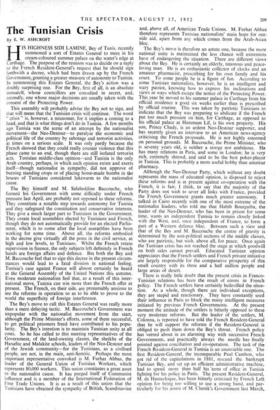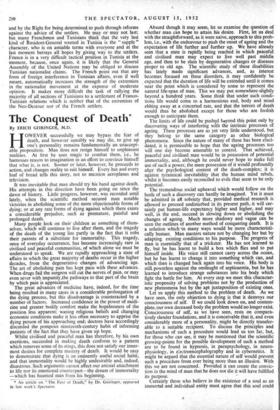The Tunisian Crisis
By E. W. ASHcROFT HIS HIGHNESS SIDI LAMINE, Bey of Tunis, recently summoned a sort of Estates General to meet in his cream-coloured summer palace on the water's edge at Carthage. The purpose of the reunion was to decide on a reply to the French Resident-General's request that he should sign forthwith a decree, which had been drawn up by the French Government, granting a greater measure of autonomy to Tunisia. In summoning this Estates General, the Bey's action was a doubly surprising one. For the Bey, first of all, is an absolute monarch; whose councillors are consulted in secret, and, secondly, one whose major decisions are usually taken with the consent of the Protecting Power.
This assembly will probably advise the Bey not to sign, and that will mean that the Tunisian crisis will continue. The word " crisis " is, however, a misnomer, for it implies a coming to a head, and that is what things don't do in Tunisia. A few months ago Tunisia was the scene of an attempt by the nationalist movement—the Neo-Destour—to paralyse the economic and political life of the country by sabotage and terrorist activities, at times on a serious scale. It was only partly because the French showed that they could really counter violence that this phase came to an end, though there are still isolated terrorist acts. Tunisian middle-class opinion—and Tunisia is the only Arab country, perhaps, in which such opinion exists and exerts itself—though nationalist in sympathy, did not approve of burning standing crops or of placing home-made bombs in the houses of Tunisians considered lukewarm to the nationalist cause.
The Bey himself and M. Salaheddine Baccouche, who formed his Government with some difficulty under French pressure last April, are probably not opposed to these reforms. They constitute a notable step towards autonomy for Tunisia and they safeguard the constitution and conservative interests., They give a much larger part to Tunisians in the Government. They create local 'assemblies elected by Tunisians and French, though they do not automatically provide for an elected Parlia- ment, which is to come after the local assemblies have been working for some time. Above all, the reforms embodied in the decree give virtually all the posts in the civil service, at high and low levels, to Tunisians. Whilst the French retain supervision in finance, the only subjects left definitely in French hands are foreign affairs and defence. But both the Bey and M. Baccouche feel that to sign this decree in the present circum- stances would lead to a fatal division in national feeling. Tunisia's case against France will almost certainly be heard at the General Assembly of the United Nations this autumn. Even moderate nationalists feel that, as a result of this inter- national move, Tunisia can win more than the French offer at present. The French, on their side, are presumably anxious to see the reforms in operation so as to be able to prove to the world the superfluity of foreign interference.
The Bey's move 'to call this Estates General was really more than a mere delaying tactic. M. Baccouche's Government was unpopular with the nationalist movement from the start, although the Prime Minister's efforts, some of them successful, to get political prisoners freed have contributed to his popu- larity. The Bey's intention is to maintain Tunisian unity at all costs. So he has called to this meeting representatives of the Government, of the land-owning classes, the sheikhs of the Hanafite and Malakite schools, leaders of the Neo-Destour and of the Jewish community—for the Tunisians, as a civilised people, are not, in the main, anti-Semitic. Perhaps the most important representative convoked is M. Furhat Abbas, the leader of the General Union of Tunisian Workers, which represents 80,000 workers. This union constitutes a great asset to the nationalist cause. It has purged itself of Communist influence and is a member of the International Federation of Free Trade Unions. It is as a result of this union that the Tunisians have obtained the sympathy of British, Scandinavian and, above all, of American Trade Unions. M. Furhat Abbas therefore represents Tunisian nationalists' main hope for out- side aid, apart from any which comes from the Arab-Asian bloc.
The Bey's move is therefore an astute one, because the more national unity is maintained the less chance will extremists have of endangering the situation. There are different views about the Bey. He is certainly an elderly, timorous and peace- loving man. He is an enthusiastic collector of clocks and an amateur pharmacist, prescribing for his own family and his court. To some people he is a figure of fun. According to some Tunisian nationalists, however, he is an intelligent and wary patriot, knowing how to express his inclinations and pews in ways which escape the notice of the Protecting Power. This year he moved to his summer palace in Carthage from his official residence a good six weeks earlier than is prescribed by official routine. This was taken by patriotic Tunisians to indicate that the Bey was preparing to abdicate if the French put too much pressure on -him, for Carthage, as opposed to his official palace at Hammam Lif, is his own property. His son, Prince Chady, is an ardent Neo-Destour supporter, and has recently given an interview to an American news-agency criticising the French proposals. He is not highly esteemed on personal grounds. M. Baccouche, the Prime Minister, who is seventy years old, is neither a stooge nor ambitious. He has many relations in Paris, and some in London; he is very rich, extremely shrewd, and said to be the best poker-player in Tunisia. This is probably a more useful hobby than amateur pharmacy.
Although the Neo-Destour Party, which without any doubt represents the mass of educated opinion, is disposed to reject these reforms and is at present against co-operation with the French, it is fair, I think, to say that the majority of the Party does not wish to sever all links with France, provided the French Government grants much greater autonomy. I talked in Cairo recently with one of the most extreme of the nationalist leaders, who told me that Habib Bourguiba, the leader of the Neo-Destour, who has been in prison for some time, wants an independent Tunisia to remain closely linked with the West, and, once independent of France, to form a part of a Western defence bloc. Between such a view and that of the Bey and M. Baccouche the centre of gravity is determined by the non-political sections of the middle classes, who are patriotic, but wish, above all, for peace. Once again the Tunisian crisis has not reached the stage at which goodwill on both sides cannot prevail. Educated Tunisian opinion appreciates that the French settlers and French private initiative are largely responsible for the comparative prosperity of this small country with its three and a half million people and large areas of desert.
There is really little doubt that the present crisis in Franco- Tunisian relations has been the result of errors in French policy. The French settlers have certainly bedevilled the situa- tion. As a whole, though there are individual exceptions, they are stupid and reactionary. They have constantly used their influence in Paris to block the many intelligent measures initiated by previous French Governments. At the present moment the attitude of the settlers is bitterly opposed to these very moderate reforms. But the leader of the settlers, M. Colonna, is reported to have told the French Resident-General that he will support the reforms if the Resident-General is obliged to push them down the Bey's throat. French policy has veered about in an alarming way with successive French Governments, and practically always the needle has finally pointed against conciliation and co-operation. The task of the French Resident-General in Tunisia is an unenviable one. The first Resident-General, the incomparable Paul Cambon, who got rid of the capitulations in 1881, rescued the bankrupt Tunisian Bey, and set up an efficient administrative machine, had to spend more than half his -term of office in Tunisia fighting for his policy in Paris. The present Resident-General, M. de Hautecloque, has been bitterly criticised by French Left opinion for being too willing to use a strong hand, and par- ticularly for his arrest of M. Chenik's Government last March, and by the Right for being determined to push through reforms against the advice of the settlers. He may or may not last; but many Frenchmen and Tunisians think that the very last kind of Resident-General wanted in Tunisia is the " supple " character, who is on amiable terms with everyone and at the last moment betrays all hopes by giving way to the settlers. France is in a very difficult tactical position in Tunisia at the moment, because, once again, it is likely that the General Assembly of the United Nations may be obliged to discuss Tunisian nationalist claims. The French point out that any form of foreign interference in Tunisian affairs, even if well meant, automatically increases the strength of the extremists in the nationalist movement at the expense of moderate opinion. It makes more difficult the task of rallying the majority of all sections of Tunisians to a settlement of Franco- Tunisian relations which is neither that of the extremists of the Neo-Destour nor of the French settlers.



























 Previous page
Previous page